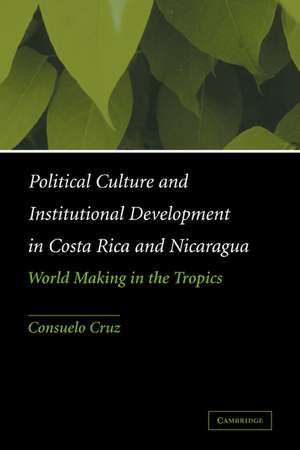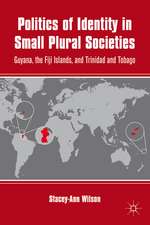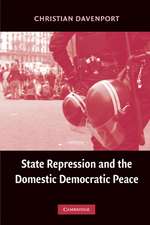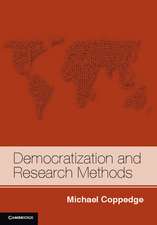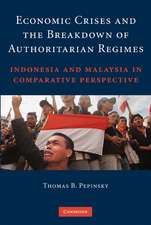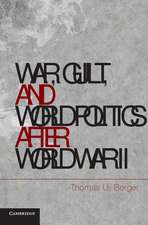Political Culture and Institutional Development in Costa Rica and Nicaragua: World Making in the Tropics
Autor Consuelo Cruzen Limba Engleză Paperback – 19 aug 2009
| Toate formatele și edițiile | Preț | Express |
|---|---|---|
| Paperback (1) | 281.91 lei 6-8 săpt. | |
| Cambridge University Press – 19 aug 2009 | 281.91 lei 6-8 săpt. | |
| Hardback (1) | 545.10 lei 6-8 săpt. | |
| Cambridge University Press – 21 aug 2005 | 545.10 lei 6-8 săpt. |
Preț: 281.91 lei
Nou
Puncte Express: 423
Preț estimativ în valută:
53.97€ • 56.10$ • 44.75£
53.97€ • 56.10$ • 44.75£
Carte tipărită la comandă
Livrare economică 05-19 februarie 25
Preluare comenzi: 021 569.72.76
Specificații
ISBN-13: 9780521120401
ISBN-10: 0521120403
Pagini: 304
Dimensiuni: 152 x 229 x 17 mm
Greutate: 0.45 kg
Editura: Cambridge University Press
Colecția Cambridge University Press
Locul publicării:New York, United States
ISBN-10: 0521120403
Pagini: 304
Dimensiuni: 152 x 229 x 17 mm
Greutate: 0.45 kg
Editura: Cambridge University Press
Colecția Cambridge University Press
Locul publicării:New York, United States
Cuprins
1. Theoretical overview; 2. Manichean identities and normative scheming: origins; 3. Orphans of Empire: constructing national identities; 4. Post-colonial paths: rhetorical strategies and frames; 5. Costa Rica: possibility mongers; 6. Nicaragua: hybrid arbitration; 7. Tropical histories: paradise and Hell on Earth; 8. Transition: familiar novelties.
Recenzii
"Cruz has written a magisterial work that truly goes beyond the countries under the microscope to a level of theoretical sophistication that should revolutionize the study of political culture and its influence on determining varying political outcomes. This book should be read and reread by historians, political scientists, Latin Americanists, and most of all, policy makers. Essential."
-Choice
"This well-researched and well-argued book is an important addition to the literature on economic and political development, not just for the two cases examined, but for the larger context of the developing world. This attempt to re-situate political culture as a centrally important explanatory variable adds a fresh perspective to current analyses, and Consuelo Cruz's way of conceptualizing political culture as a dynamic, interactive variable that is engaged with other factors (economic, institutional) makes for a sophisticated and novel analysis ... An important read for those interested in new approaches to studying comparative politics."
-Bruce M. Wilson, University of Central Florida, Political Science Quarterly
"Political Culture and Institutional Development in Nicaragua and Costa Rica: World-Making in the Tropics is a bold and beautifully written book. Consuelo Cruz's innovative interpretation of culture, colonialism, and normative scheming simultaneously breaks new theoretical ground, unearths new empirical material, and provides a novel explanation of divergent political trajectories in contemporary Central America. As such, this excellent book deserves a wide readership among scholars of regime politics, political culture, comparative historical processes, and Latin American politics."
-Deborah J. Yashar, Princeton University
"This is a pioneering and convincing analysis of how two very different political cultures, in neighboring countries, emerged and evolved. Cruz documents how and why political culture mattered for such key variables as the relative degree of a law bounded state, foreign intervention, democratization, and a consensually based welfare state. This major book should help invigorate historically based studies of political culture in comparative politics."
-Alfred Stepan, author of Arguing Comparative Politics
"Cruz ... eschews cultural determinism, cogently arguing, in forceful and sophisticated prose, that perspicacious leaders can rather rapidly remold national cultures and improve political institutions."
Foreign Affairs
"...sharp and insightful political narrative that will influence readers' views of the Sandinista."
- Timothy E. Anna, University of Manitoba
"Political Culture and Institutional Development in Costa Rica and Nicaragua is a masterpiece that combines new insights of political culture theory construction with an immense trove of historical facts about the two countries. Cruz shows a very rare creative ability in mixing a rich historical narrative with a new understanding of the role of political culture, which involves normative schemes, rhetoric, and imaginative possibilities...The analysis and conclusions add to our understanding of why Latin American nations, as a rule, seem unable to overcome the obstacles that would allow democratic consolidation in this region."
- Marcello Baquero, Federal University of Rio Grande do Sul, Latin American Politics and Society
-Choice
"This well-researched and well-argued book is an important addition to the literature on economic and political development, not just for the two cases examined, but for the larger context of the developing world. This attempt to re-situate political culture as a centrally important explanatory variable adds a fresh perspective to current analyses, and Consuelo Cruz's way of conceptualizing political culture as a dynamic, interactive variable that is engaged with other factors (economic, institutional) makes for a sophisticated and novel analysis ... An important read for those interested in new approaches to studying comparative politics."
-Bruce M. Wilson, University of Central Florida, Political Science Quarterly
"Political Culture and Institutional Development in Nicaragua and Costa Rica: World-Making in the Tropics is a bold and beautifully written book. Consuelo Cruz's innovative interpretation of culture, colonialism, and normative scheming simultaneously breaks new theoretical ground, unearths new empirical material, and provides a novel explanation of divergent political trajectories in contemporary Central America. As such, this excellent book deserves a wide readership among scholars of regime politics, political culture, comparative historical processes, and Latin American politics."
-Deborah J. Yashar, Princeton University
"This is a pioneering and convincing analysis of how two very different political cultures, in neighboring countries, emerged and evolved. Cruz documents how and why political culture mattered for such key variables as the relative degree of a law bounded state, foreign intervention, democratization, and a consensually based welfare state. This major book should help invigorate historically based studies of political culture in comparative politics."
-Alfred Stepan, author of Arguing Comparative Politics
"Cruz ... eschews cultural determinism, cogently arguing, in forceful and sophisticated prose, that perspicacious leaders can rather rapidly remold national cultures and improve political institutions."
Foreign Affairs
"...sharp and insightful political narrative that will influence readers' views of the Sandinista."
- Timothy E. Anna, University of Manitoba
"Political Culture and Institutional Development in Costa Rica and Nicaragua is a masterpiece that combines new insights of political culture theory construction with an immense trove of historical facts about the two countries. Cruz shows a very rare creative ability in mixing a rich historical narrative with a new understanding of the role of political culture, which involves normative schemes, rhetoric, and imaginative possibilities...The analysis and conclusions add to our understanding of why Latin American nations, as a rule, seem unable to overcome the obstacles that would allow democratic consolidation in this region."
- Marcello Baquero, Federal University of Rio Grande do Sul, Latin American Politics and Society
Descriere
This book explores the reasons behind the many failed attempts to build stable democracies in Latin America.
